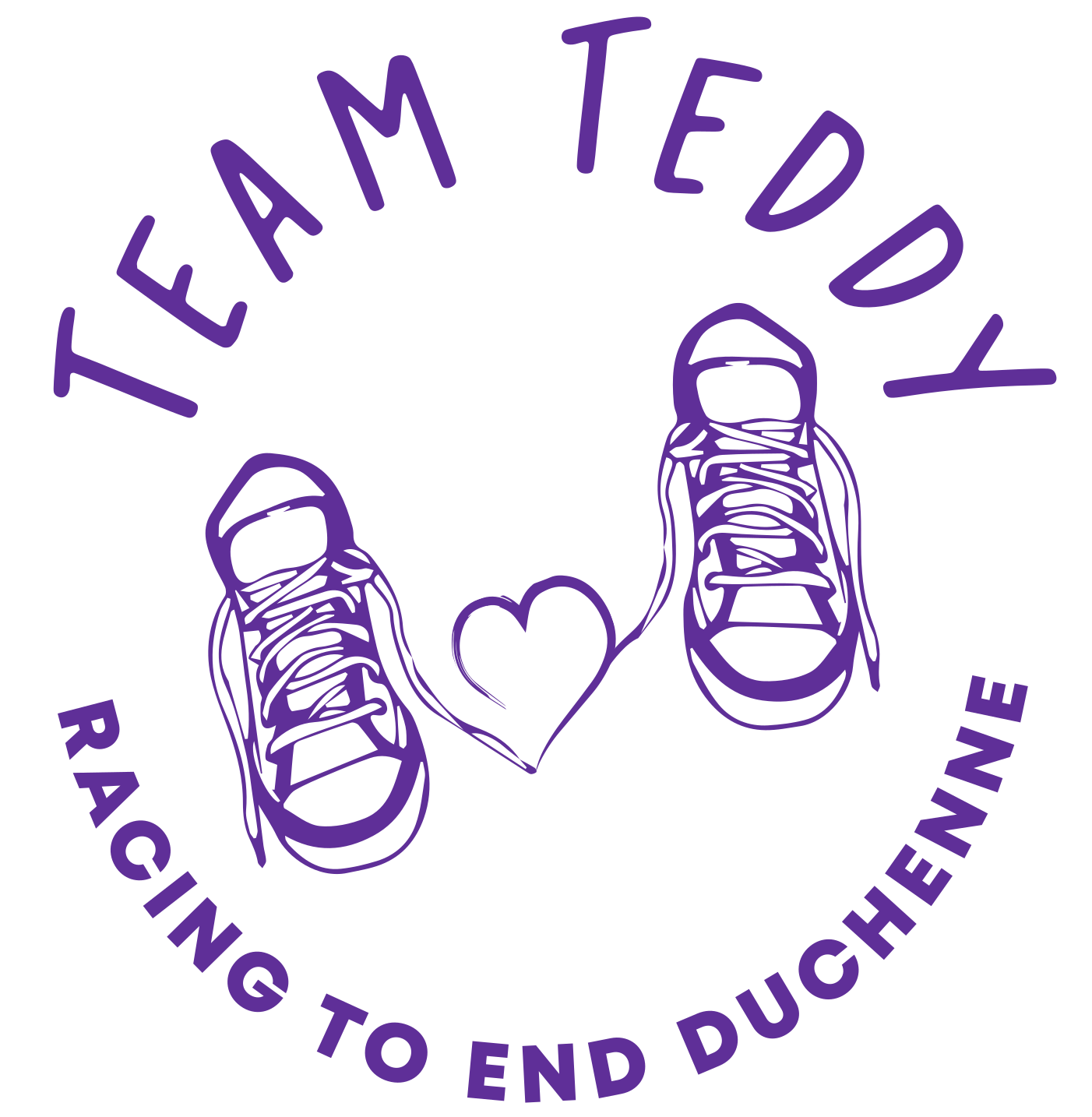
TEAM TEDDY 5K 2023
RACING TO END DUCHENNE
Sunday, October 1st, 2023 • 8:30 AM
Barlow Mountain Elementary School

TEAM TEDDY 5K
RACING TO END DUCHENNE
October 1, 2023
8:30 AM
Barlow Mountain Elementary School
Join us!
Racing for a cure for Duchenne with Team Teddy raises awareness, support, and funding towards a cure for this challenging disorder.
Donate!
Donations to Team Teddy 5K go directly to Parent Project Muscular Dystrophy (PPMD), a leading Duchenne advocacy, education, and research organization.
Get inspired!
Whether you walk or run the route, or simply make a donation, your support will directly impact our quest for a cure!
About Team Teddy 5K
This year is the 4th Team Teddy 5K, raising awareness and funds for Duchenne Muscular Dystrophy. Started due to the pandemic pausing a 2020 Chicago Marathon fundraiser for Parent Project Muscular Dystrophy in honor of Teddy, who was diagnosed in 2019. Friends brought the run to Ridgefield, growing from 12 to 100 participants in 3 years, all thanks to our amazing community.
We’ll have coffee and treats from local vendors, a sensory art station graciously provided by Kate Haase-MacDonald and her kids party company, Silly Goose, along with photography, once again generously provided by JW Brown Photography.
New this year: Pick up your run t-shirt on Friday, September 29th from 4:00-9:00 PM and join us for a drink at the grand re-opening (it’s been a while…250+ years) of the historic Coach House Tavern, conveniently located in our very own basement (address will be emailed to registered runners and donors).
Run winners, along with the highest fundraisers, will receive engraved mugs that will hang from the ceiling of the tavern for years to come.
About Teddy
Teddy is a 5-year-old boy with a contagious laugh and smile with an overall zest for life. He thoroughly enjoys swimming or floating, digging in dirt or sand, and is a master of puzzles. Teddy loves modeling his older brother Caiden and loves giving hugs to friends. Although Teddy might not have the same physical abilities as other children his age, that doesn’t stop him from enjoying sled skiing, hitting golf balls, and playing modified baseball. His first favorite color is purple, the chosen color for the Team Teddy 5K logo. Teddy is a brave warrior and ceases to amaze his parents and doctors with his ability to tolerate the many medical appointments and treatments that go along with being a child with Duchenne.
About Duchenne
Duchenne is a genetic disorder that causes progressive muscle loss in the absence of dystrophin, a muscle-building protein. It is a multi-systemic condition, it impacts the skeletal, cardiac, and pulmonary muscles. Most boys with Duchenne become non-ambulatory in their early teens, many succumb to heart failure or respiratory failure in their 20’s. Duchenne affects approximately 1/5,000 live male births with an estimated 20,000 children diagnosed worldwide each year. There is currently no cure, but we believe it is within reach thanks to scientific advances of gene therapy and gene editing.
In 2022, we were fortunate to enroll Teddy in a two-year gene therapy trial -- a “mini gene” shown to help deliver some dystrophin to muscles at the University of Rochester, Justin’s alma-mater. This June, the study sponsor, Sarepta, was granted accelerated FDA approval for the therapy based on earlier trials; however, the approval was only for 4- and 5-year-old boys, while we await results of Teddy’s phase 3 trial. So, Teddy is one of the gene therapy pioneers -– but we must continue to work toward a true cure that reaches every single boy impacted by Duchenne.
Our Sponsors
Join us!
Join us at Barlow Mountain Elementary on Sunday, October 1st, 2023 for an 8:30am race start time.
We’ll be running/walking a flat course along North Street to Wooster Street.












Frequently Asked Questions
-
Duchenne is a genetic disorder that causes progressive muscle loss in the absence of dystrophin, a muscle-building protein. A multi-systemic condition, it impacts the skeletal, cardiac, and pulmonary muscles. Most boys with Duchenne become non-ambulatory in their early teens; many succumb to heart or respiratory failure in their 20s. Duchenne affects approximately 1:5,000 male births, with an estimated 20,000 children diagnosed worldwide each year. There is currently no cure, but we believe it is within reach thanks to the scientific advances of gene therapy and gene editing.
-
Gene therapy in Duchenne aims to address the lack of the protein dystrophin by putting a new gene inside muscle cells. The goal for this new gene is to give the cells instructions in hopes of making a working version of the dystrophin protein.
The dystrophin gene, or DMD gene, is the largest in the human body, which can make it difficult to deliver to cells. To get around this challenge, researchers are looking at how to use only the most important parts of the original gene. This allows them to see if the combination they chose for the new gene can help cells produce dystrophin. It would be a different kind of dystrophin than the body makes naturally, but one that's designed to do the same job.
Each gene therapy is made of 3 main parts: A vector, a promoter, and a transgene. These 3 components are designed to work together to help the body make a different, but working, version of the protein.
Each gene therapy is unique, even when they are designed to treat the same disease. Which vector, promoter, and transgene scientists select can impact how well the gene therapy might work and the side effects a person may have. That's why scientists rigorously test different combinations in a laboratory before selecting the final pieces and beginning clinical trials.
-
Like many boys diagnosed with Duchenne, Teddy had some subtle but noticeable delays early on. The early theories? It’s his tongue tie, his minor torticollis and brachycephaly (misshaped head)…he’s a late bloomer. But soon, those delays felt harder and harder to ignore. We pursued early intervention therapies but as time went on—he finally walked at 20 months—those delays demanded specialists.
When we got to those specialists at the Children’s Hospital of Philadelphia (CHOP), we went through tons of ups and downs of struggling toward diagnosis. Our neurologist informed us that Teddy’s CK (muscle inflammation marker) level was 26,000; a normal level is around 500. As a physical therapist, I knew that result was associated with muscular dystrophy, but we wouldn’t know for sure until the diagnosis via a genetic test.
We waited an agonizing six weeks for that test to come back with the final confirmation, on the day before Thanksgiving 2019, a few weeks before Teddy’s second birthday: Teddy had Duchenne muscular dystrophy, a progressive, eventually fatal diagnosis. On that day, we joined a club no one wants to join, the Duchenne community. But as painful as that membership card would be, it unlocked connections with other families and the support of friends and family who propelled us through the life-changing news.
-
Care for a boy with Duchenne is led by a pediatric neurologist with a hospital care team consisting of a cardiologist, physical therapist, occupational therapist, pulmonologist, endocrinologist, nutritionist, genetic counselor, and others. In the childhood stage that Teddy is in, we see his team at UMASS Memorial Medical Center every 6 months. Regular testing procedures performed for this age include: fasting blood work, echocardiogram, EKG, DEXA scan and x-rays for bone density and scoliosis assessment, timed mobility assessments, and range of motion assessments.
-
Your tax-deductible donation is made to Parent Project Muscular Dystrophy (PPMD), the largest Duchenne organization in the U.S. PPMD funds cutting edge research towards a cure for Duchenne and supports families to gain access to expert healthcare providers, treatments, and a community of support. PPMD’s advocacy efforts have secured hundreds of millions of dollars in funding and won five FDA approvals.
“Everything we do — and everything we have done since our founding in 1994 — helps those with Duchenne live longer, stronger lives. We will not rest until we end Duchenne for every single person affected by the disease.”
Parent Project Muscular Dystrophy (PPMD) | Fighting to End Duchenne (parentprojectmd.org)





















